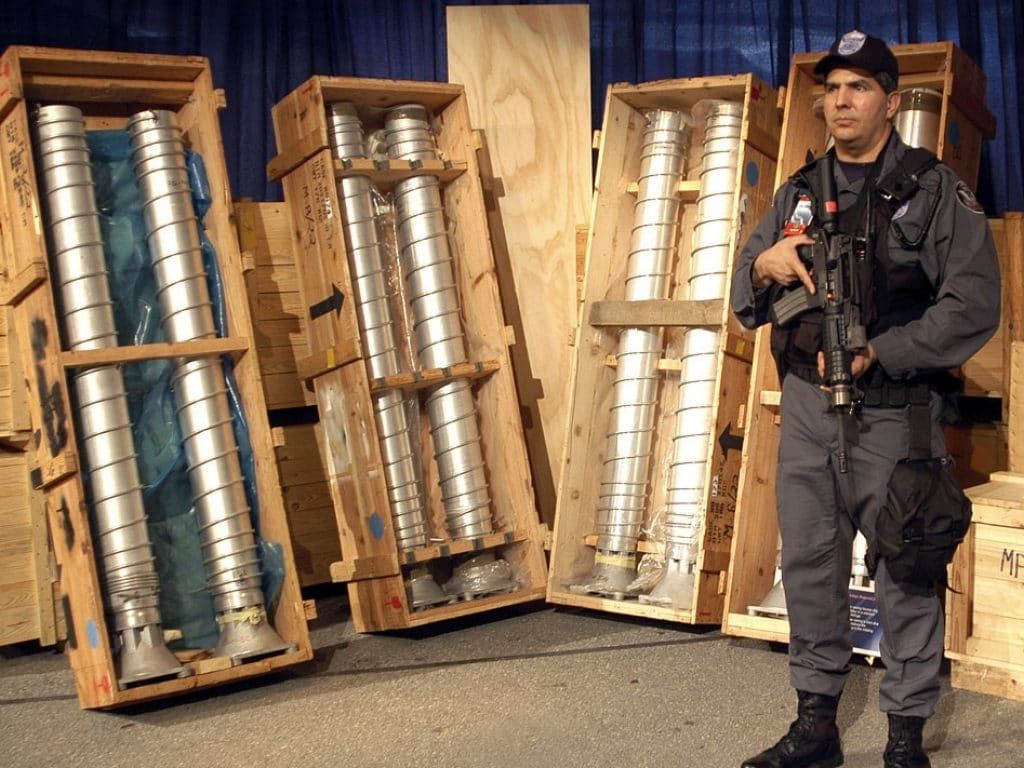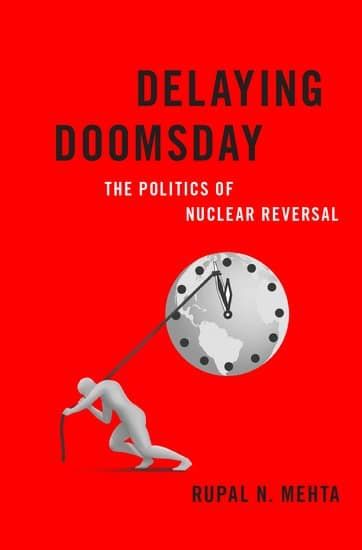Interview: “Delaying Doomsday” author explains how to stop nuclear proliferation
By John Krzyzaniak | February 13, 2020
 Gas centrifuges that were interdicted en route to Libya in 2003. Later that year, Muammar Qaddafi agreed to abandon his WMD programs. Photo credit: Wikimedia commons.
Gas centrifuges that were interdicted en route to Libya in 2003. Later that year, Muammar Qaddafi agreed to abandon his WMD programs. Photo credit: Wikimedia commons.
In this interview, Rupal Mehta, a professor of political science at the University of Nebraska, speaks with Bulletin editor John Krzyzaniak about her new book, Delaying Doomsday: The Politics of Nuclear Reversal. Mehta explains why the Trump administration’s “maximum pressure” approach to Iran will not work; how a freeze on North Korea’s nuclear program could be achieved; and why she’s optimistic about nonproliferation efforts worldwide.
John Krzyzaniak: Both the title and the cover of your book evoke the Bulletin’s famous Doomsday Clock. I’m curious whether the Clock shows up anywhere in any of your research or the interviews you did?

Rupal Mehta: Yes, absolutely. I had been trying to figure out how to convey what I think is one of the core messages of the book, which is that it’s not too late to stop nuclear proliferation: The acquisition of nuclear weapons can be delayed or arrested altogether. Throughout the course of my research and in talking with experts, the idea that this phenomenon is a big part of what is affecting the Bulletin’s countdown to midnight came up a few different times. The Clock is also arguably one of the most iconic and influential images in international security and nuclear security, and a lot of the researchers working in the field care deeply about trying to move the hands back. So the title and cover of the book grew out of that.
JK: The basic argument of the book is that if the world wants to stop a particular country from pursuing or acquiring nuclear weapons, then the United States and the international community need to come up with some sort of package of carrots and sticks—or maybe better to say rewards and punishments—to persuade that country to give up its nuclear ambitions. And there’s a second piece, which is that there needs to be a credible threat of military force backing up those efforts. Is that an accurate characterization?
RM: Yes, absolutely.
JK: To me, that is eminently plausible—almost common sense. So what’s so controversial about it?
RM: I completely agree. I think that anyone who knows how to bargain or engage in negotiation of any sort understands that you have to have some sort of combination of goodies alongside some parallel punishments to be able to get people to change their behavior.
I think the most counterintuitive and surprising aspect of the scholarship on nuclear reversal or counterproliferation to date has been that the majority of that work has said, “We just have to punish bad behavior.” They say, “It’s nefarious behavior that these states are engaging in, so we just have to punish them with sanctions or threats of force or any other option on the table.” So the argument that I’m trying to make—that you really do need both punishments and incentives—is not a commonly-held view.
What I’m proposing is also sometimes politically untenable or undesirable. Many politicians don’t want to reward a country that is seen to be engaging in behavior that is nefarious or provocative or not in accordance with the rules of the international system. But that’s what is often needed. Rewards can give leaders a way to save face among their domestic audiences, and that aspect is often overlooked.
The final controversial piece is the part about threats of military force against proliferators. Americans have frequently heard the idea of “all options on the table,” so maybe it’s not controversial to them. But it is provocative to claim that this is a necessary ingredient. As soon as that threat translates into the actual use of force, there’s a real risk that a state might become more entrenched in its pursuit of nuclear weapons, which is exactly what the counterproliferation efforts are trying to avoid in the first place.
JK: The Trump administration’s “maximum pressure” approach to Iran seems like a policy of only punishment. All sticks and no carrots. If you were advising the administration, would your recommendation be to offer more positive incentives? And, if so, how do you do that without looking like you’re rewarding a bad actor?
RM: A lot of that was worked out in the lead up to the Joint Comprehensive Plan of Action, the agreement between Iran and world powers that was signed in 2015. A complex arrangement of rewards, sanctions, and potential punishments was laid out to the Iranians, and they accepted a deal that had those components.
If I were advising the Trump administration, I’d first want to know what their ultimate goal is. If the goal really is to prevent Iran from getting nuclear weapons, then sooner or later there needs to be some kind of face-saving incentive for Iran.
What’s also very important is that agreements be credible. In the book, I assume agreements will be upheld by both sides, but experience shows that’s not always true. That’s another hurdle for the Trump administration today, because they’ve been reneging on deals that other parties think are working. That will make it difficult going forward when the United States is trying to convince other countries to sign on to agreements.
JK: You stress the importance of credible military threats as a key piece of the puzzle. Do you think there’s a credible military threat against North Korea today?
RM: I don’t. I will admit, however, that I don’t have any access to Pentagon war plans, and I’m not privy to any classified information about what’s going on inside the Defense Department. But from what I’ve been able to gather from public information, a preventive war or the use of military force against North Korea would be incredibly risky and undesirable. And to some degree, I think that what we’re seeing in North Korea reflects that. Even though the North Koreans claim that they’re worried about a US invasion, they’ve been able to ramp up their nuclear program with very little reaction and very little pushback from the United States. That suggests that military threats are not actually affecting their calculation, or at least not in the way the United States wants.
JK: Do you think there was ever a credible military option against North Korea?
RM: My reading of the history, including recently declassified documents going back 20 or 30 years, is that there really hasn’t ever been substantial support within the US government for using military force against North Korea. I think the reasons for that are clear—it would put the South Koreans and other allies in the region in grave danger, plus it could jeopardize the shaky US relationship with China. This was made especially clear during the lead up to the 1994 Agreed Framework. Though there had been murmurings of a plan to attack North Korea, according to former Secretary of Defense, Bill Perry, they were never activated or pursued. When President Clinton realized the serious toll that military force would take on the Korean peninsula, he abandoned the idea.
JK: So does that put North Korea out of reach in terms of convincing them to give up their nuclear weapons?
RM: I don’t think so. Even though the military threat may not be credible, North Korea could still be incentivized to give up its nuclear weapons program. It might just require a slightly more nuanced concoction of rewards and punishments. Again, though, the United States will need to shore up its credibility. If the United States can devise a clear strategy and find a way to help solidify its credibility, then I think that even an entrenched state like North Korea could be convinced to at least pause their nuclear program and put an end to the hostility.
JK: Overall, are you optimistic about nonproliferation across the world?
RM: I’m more optimistic now than I was when I first started the project, many years ago. That’s in part because we’ve seen just how often diplomatic efforts toward counterproliferation can work. That’s not to say that I don’t agree with the assessment that the Bulletin made with its latest Doomsday Clock announcement. But I do think that in this one area, there might be cause for optimism.
Together, we make the world safer.
The Bulletin elevates expert voices above the noise. But as an independent nonprofit organization, our operations depend on the support of readers like you. Help us continue to deliver quality journalism that holds leaders accountable. Your support of our work at any level is important. In return, we promise our coverage will be understandable, influential, vigilant, solution-oriented, and fair-minded. Together we can make a difference.
Keywords: Doomsday Clock, Iran, JCPOA, North Korea, nonproliferation, nuclear proliferation
Topics: Interviews, Nuclear Risk














